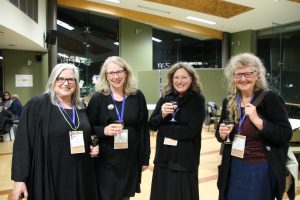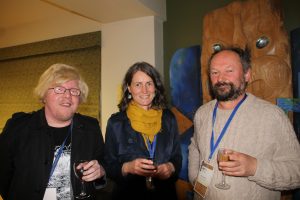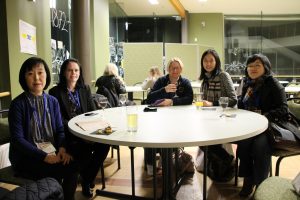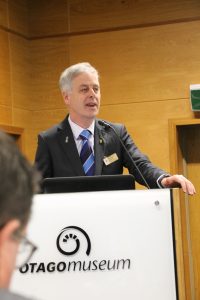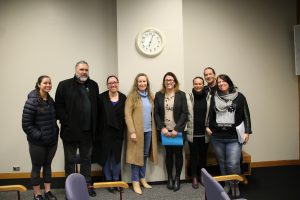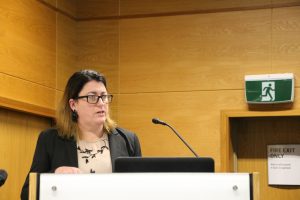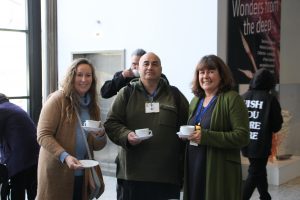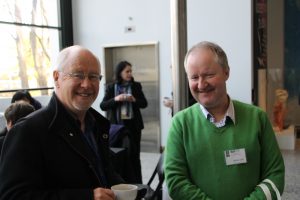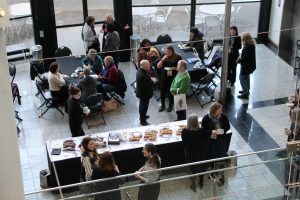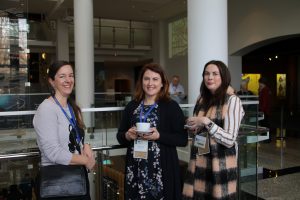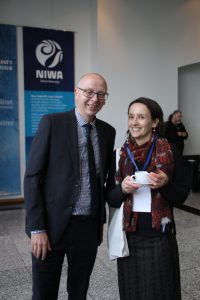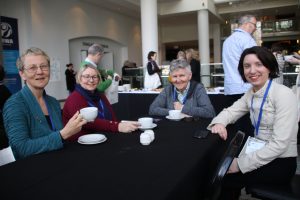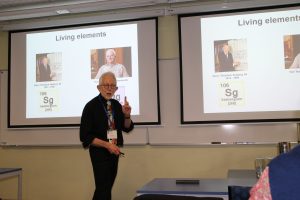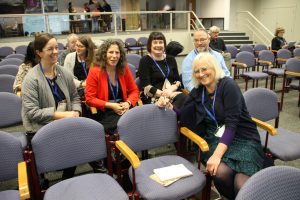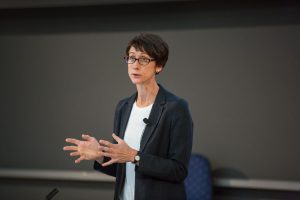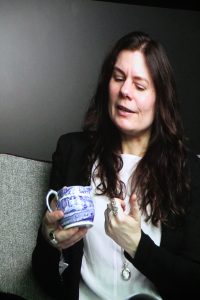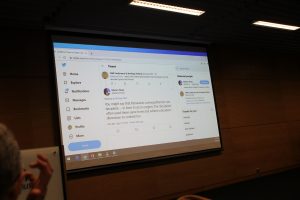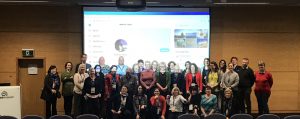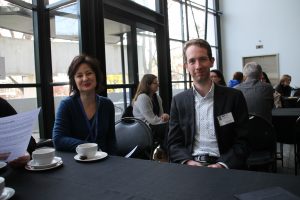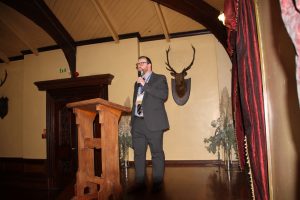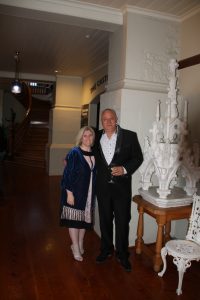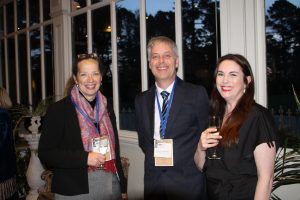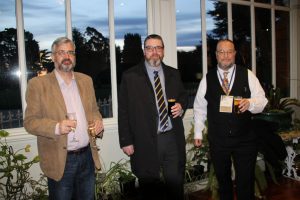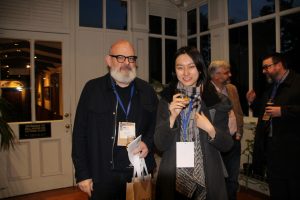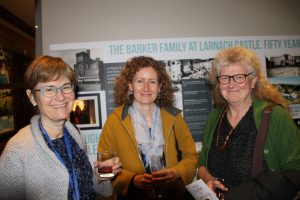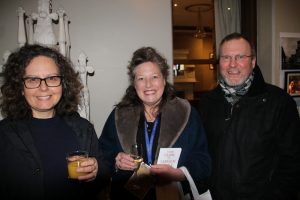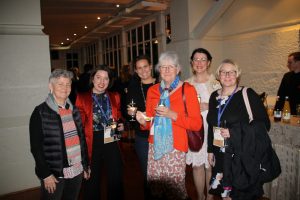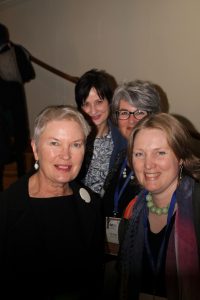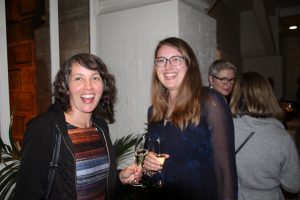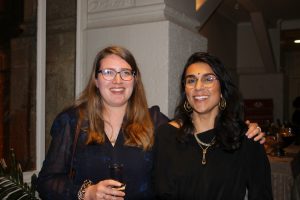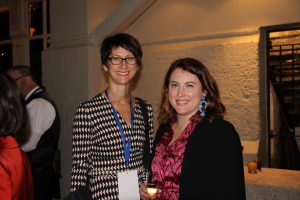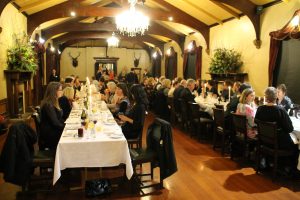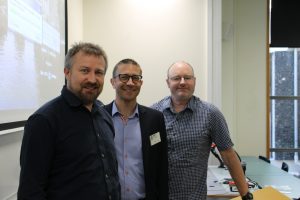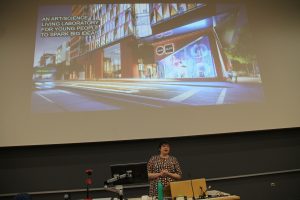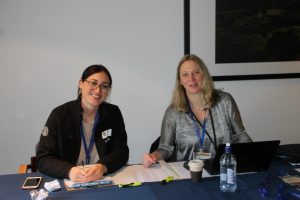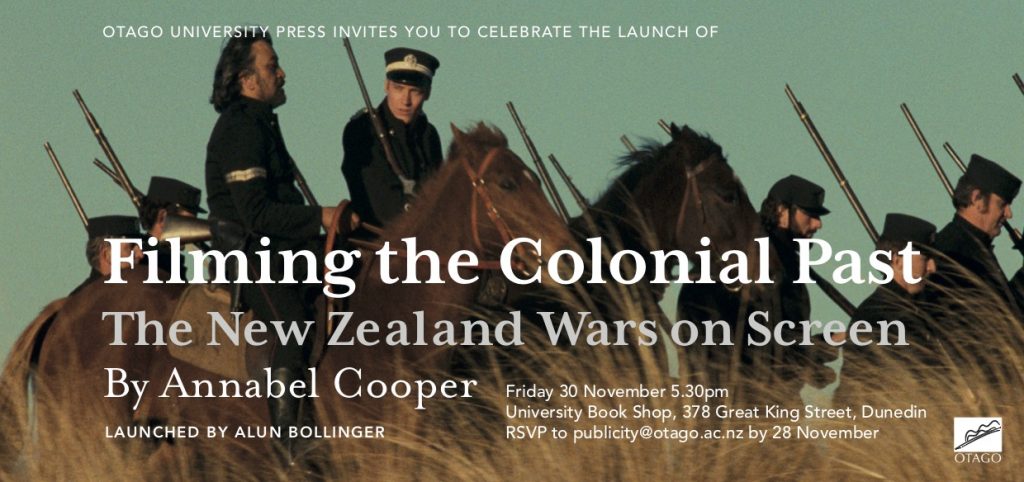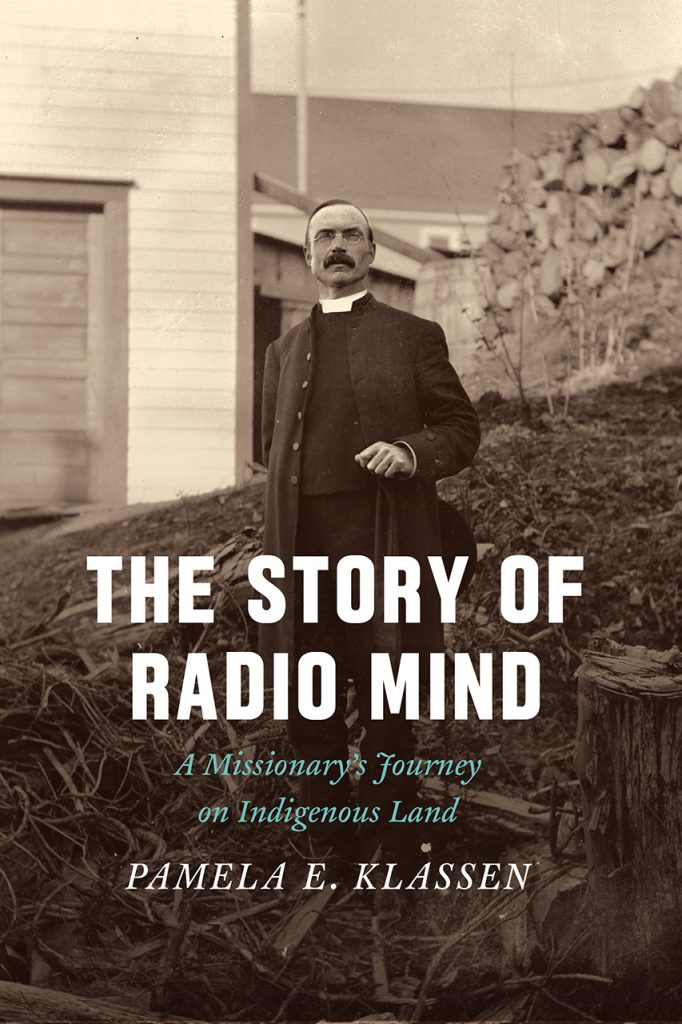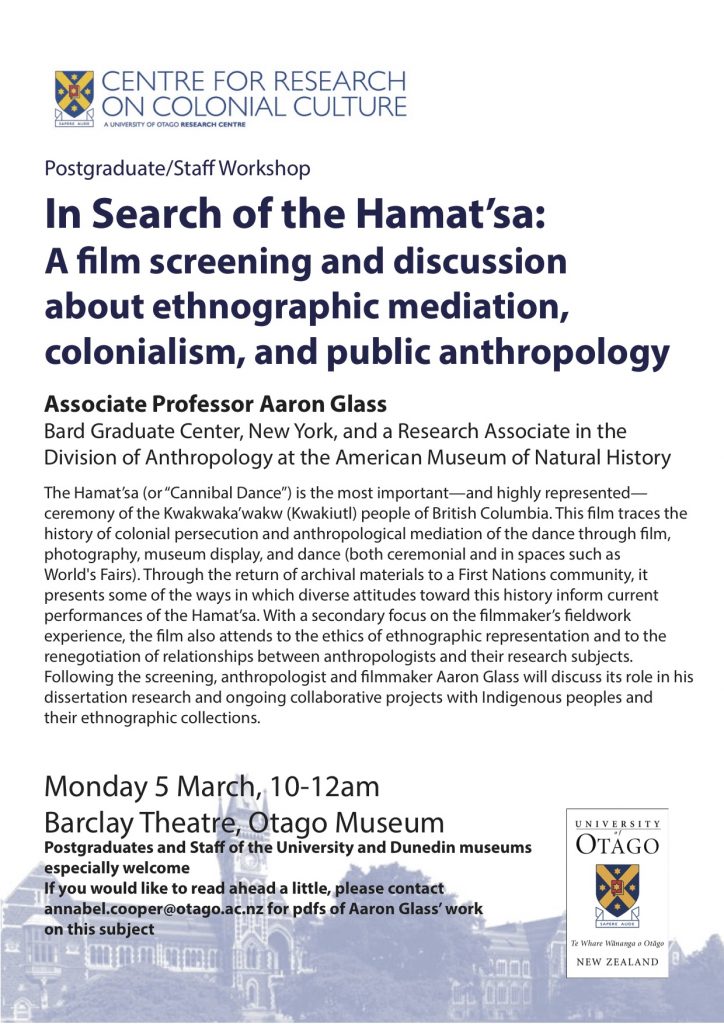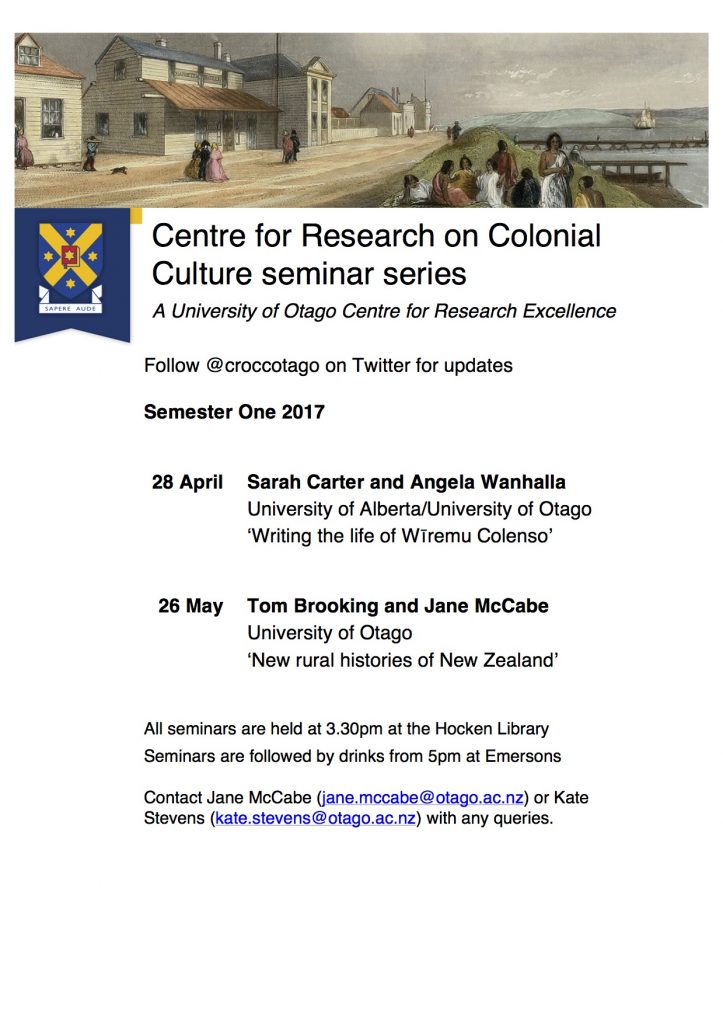The amazing “1869” conference
Otago hosted a brilliant hybrid conference this week, the “1869 Conference and Heritage Festival”. By “hybrid” I mean that it was the annual conference for the Australasian Victorian Studies Association, while also celebrating the University of Otago’s 150th anniversary, and sitting alongside the Dunedin Heritage Festival. While the Centre for Colonial Culture was a key sponsor, with Associate Professor Angela Wanhalla as one of the co-convevors (together with Kirby Hallum), a cross section of the university’s faculty was represented on the organising committee. The melange meant that most people engaged with papers that they would normally never encounter at their more usual disciplinary conferences, although this added to, rather than diminished, the event’s success. [See below for photos]
On Wednesday evening, the conference began with an all-women panel, looking at “Heritage through Words, Pictures and Threads”. Chaired by Kirby, the panel featured the novelist and academic, Tina Makereti, who discussed her latest novel, The Imaginary Lives of James Poneke; Lisa Chatfield, the producer for the BBC television adaptation of The Luminaries; Madeleine Seys, author of Fashion and Narrative in Victorian Popular Literature; and Otago’s Catherine Smith, an expert behind the science of traditional Māori weaving. This was a wonderful collaboration, exciting for those interested in the sumptuous garments of the Victorian era, but also drawing a number of different “threads” together. This was followed by a reception held in Te Tumu: School of Māori, Pacific and Indigenous Studies.
1869 was formally opened in the Otago Museum on Thursday (26 September) with a mihi whakatau from Tuari Pōtiki representing both Kāi Tahu and the university, a short welcome from the DVC Research, Professor Richard Blaikie, and an amusing and uplifting speech from the Hon Grant Robertson, an Otago alumnus as well as the current (among other portfolios) Minister for Arts, Culture and Heritage. The PVC Humanities, Professor Tony Ballantyne then introduced the first keynote speaker, Megan Pōtiki of Te Tumu, who discussed how the school established in 1869 contributed to the demise of the speaking of te reo Māori at Ōtākou, just under 30 minutes drive from the city. However, in more recent years the concerted efforts of local people have seen the revival in the language at the kāik.
There are too many individual presentations to mention them all. Most were what one might expect at a history or literature conferences, but also sprinkled with a few science-orientated talks as well. Several stand out, such as the presentation by Dr Ian Chapman on the links between Jules Verne’s From the Earth to the Moon with David Bowie’s Space Oddity – including a live band!; Lyndon Fraser’s swirling PowerPoint while discussing women’s wills in Victorian Canterbury; and Lyall Hanton’s physically animated talk on Joseph Mellor’s 16 million words on the Periodic Table. But the organisers were gratified at the high quality of all the panel presentations.
The conference highlights, of course, were the keynotes. On Thursday evening, people braved a dismal night to listen to Helen Pearson, editor of Nature, a journal that shares a 150th birthday with the university. Helen gave a wonderful talk on the past, present and future of this illustrious journal, noted not just for its academic papers but the science reporting and commentary. The “past” incorporated some of the journal’s many key publications, such as Francis Crick and James Watson’s groundbreaking paper on DNA in 1929, as well as a notable failure, an account on cold fusion. Helen also discussed Nature’s current situation, and how that may change with the growing demand for open-access publications.
Marian Thain, of Kings College London, was unable to make it to Dunedin for the conference, but nevertheless presented on“Cosmopolitanism, Nationalism and the Politics of Parnassian Poetry (1860s-1880s)” on Friday. An exploration of how English poets adapted the ballade, a French poetry genre, the talk discussed how the Parnassian poets’ efforts spawned tensions between those who favoured a more international outlook and those who advocated for more British forms of verse. Marion pre-recorded her video presentation, and invited questions via Twitter both during and after its viewing, which worked really successfully. Indeed, the conference goers included a number of enthusiastic tweeps, with the conference at one point trending up to 5th place in New Zealand’s Twitter rankings. See #otago1869 and #avsa2019.
Conference goers were treated on Friday evening to a bus trip up to the historic Larnarch’s Castle atop the Otago Peninsula. On arrival, just before dusk, the swirl of bagpipes greeted us as we alighted the buses and entered the castle. After newcomers had undertaken a tour of the building and we had all had the opportunity to wet the whistle, we all entered into the banquet hall for a marvellous feast. The “entertainment” for the evening was Professor Liam McIlvanney, who gave a wonderful speech arguing that Rev Thomas Burns, the nephew of the great poet, the first clergyman of Dunedin’s Free Kirk settlement, and first Chancellor of the University, was perhaps not the “censorious old bigot” that secularist historians have labelled him.
Tilly Boleyn, the Curator of Science Gallery Melbourne, was our final keynote to round off the conference. Tilly discussed how hard it was to entice young people (18-25 year olds) into science museums, which are seen as boring and irrelevant. The answer has been to establish “science galleries”, and international network tied to local universities, but whose “displays” are about engaging the public with science and art. Melbourne’s science gallery opens next year, but in the meantime they have run a number of “pop-ups” to prepare the ground. An important feature of this new style of institution has been to allow young people themselves to decide what will be presented, and to employ young people to “moderate” the exhibits with the gallery visitors. This new methodology means curators giving up power, which Tilly states, is both challenging and rewarding.
At the final wrap-up, the AVSA president Mandy Treagus announced that the next AVSA conference will be held in Melbourne at Monash University in June, 2020.
And another viewpoint from the Women Historians Blog.
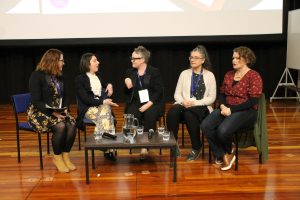
The first evening. Kirby-Jane Hallum, Madeleine Seys, Catherine Smith, Lisa Chatfield and Tina Makereti.
Book Launch: Filming the Colonial Past
Congratulations to Annabel Cooper on the release of her book, Filming the Colonial Past: The New Zealand Wars on Screen, published by Otago University Press.
If you want to purchase a copy, please join us at UBS on Friday 30 November when Filming the Colonial Past will be officially launched by Alun Bollinger.
Film screening and workshop
During his visit to the University of Otago, Associate Professor Aaron Glass (Bard Graduate Center, New York) will lead a workshop discussing his engagement in film as part of critical anthropology, the ethics of ethnographic representation, and collaborative research. All welcome. Details are below.
Museums, Digital Collections and Indigenous Futures Talks
All are welcome to attend an open seminar on Thursday 22 February featuring two scholars who will speak about their current projects that aim to reconnect indigenous communities with objects and archives, making them available for future use and reinterpretation.
Location: Moot Court, 10th Floor, Richardson Building, starting at 10am
Associate Professor Aaron Glass (Bard Graduate Center, New York) will discuss his involvement in producing a new critical edition of anthropologist Franz Boas’s 1897 landmark book, The Social Organization and Secret Societies of the Kwakiutl Indians, which uses digital media to link museums, archives and communities while recuperating ethnographic records for current and future use. Not only did the volume make draw upon existing museum collections from around the world, Boas and his indigenous collaborator, George Hunt, left a vast archive of unpublished materials relevant to the creation and afterlife of the 1897 text, including hundreds of pages of Hunt’s corrections and amendments. An international and collaborative endeavour to create a new annotated critical edition of the book – both in print and in digital formats – unites published and unpublished materials with current Kwakwaka’wakw knowledge. This presentation discusses that project and presents an interactive prototype for the digital edition that re-embeds ethnographic knowledge within Indigenous epistemological frameworks and hereditary protocols for access.
Associate Professor Conal McCarthy (Victoria University of Wellington) will outline two current trends in museum research in Australia and Aotearoa: one looking back to the history of collections, ethnology and colonisation, and the other looking forward to digital technology, co-curating and an emerging indigenous Museology. It will briefly introduce various projects which aim to reconnect tribal descendants to ancestral heritage through digital tools which enable the reassembly of scattered records, material culture and images. It will introduce the Marsden-funed project ‘Te Ao Hou: Imagining Worlds in New Zealand, 1900-1950’ led by Anne Salmond at Auckland University, which follows Māori leaders Apirana Ngata and Peter Buck through their involvement in the Dominion Museum ethnological expeditions, the Polynesian Society and the Board of Māori Ethnological Research. It considers the mobilising of relational concepts such as whakaapa/kinship, which were applied in Buck and Ngata’s ‘practical anthropology’, and the lessons of their experiments for both Māori museum practice today and contemporary tribal development generally.
Stripping Colonial Studies Back to Their Bones
The Centre’s research seminar series resumes on Friday 29 September with a presentation by Dr. Charlotte King (Department of Anatomy).
Her talk is titled: “Stripping Colonial Studies Back to Their Bones: Combining bioarchaeology and history to look at European settlement of Tokomairiro”.
Charlotte will discuss the recent excavation of ‘forgotten’ areas of the St John’s Anglican cemetery in Milton, which has given bioarchaeologists an unprecedented opportunity to reconstruct the biological histories of some of the first European settlers in the Otago region. This talk will detail what archaeologists can do to shed light on the lives of these settlers, and how this might intersect with the social histories generated by historians.
Please join us on Friday 29 September at the Hocken Library Seminar room, 90 Anzac Avenue for this talk, which begins at 3.30. Afternoon tea is provided.
All are welcome.
Summer Scholarship Opportunities
Four Summer Scholarships are available to students interested in working with Professor Charlotte Macdonald and Dr. Rebecca Lenihan on their Royal Society of New Zealand Marsden Project, Soldiers of Empire.
These scholarships are for the 2017-18 summer and involve working with collections at several institutions. There is one scholarship at Puke Ariki in New Plymouth, one available at Auckland Museum Tāmaki Paenga Hira, and one at Te Papa, Wellington.
Applications are welcome from students who have completed at least two years of their undergraduate degree and are enrolling in 3rd year, the Honours programme, or the first year of a Masters degree in 2018.
Please note that the closing date for applications is 15 September.
Further details about the scholarships and how to apply can be found here.
Film in the Colony Draft Programme Available
A Draft Programme for the forthcoming Film in the Colony Symposium is now available. Registration details as well as a registration portal will be provided soon.
Seminar Series
This semester the Centre is hosting two research seminars. Prof. Sarah Carter (University of Alberta) and Associate Prof. Angela Wanhalla (University of Otago) will give the inaugural seminar for this year’s series on Friday 28th April. They will speak about their collaborative project relating to the life of Wiremu Colenso. The talk will take place at the Hocken Seminar Room and starts at 3.30. All are welcome!
Symposium on Individual Rights and Biopolitics
A symposium on “Individualism versus Collectivism in New Zealand and the British Empire: Individual Rights and Biopolitics” is being held at Victoria University of Wellington on Saturday 8 April (click on the Programme for further details). It features talks from leading New Zealand historians, including two from the Centre for Research on Colonial Culture: Barbara Brookes and Jane McCabe. Even better, the symposium is free! If you are interested in attending please contact Professor Charlotte Macdonald (charlotte.macdonald@vuw.ac.nz) to register.

